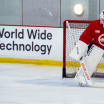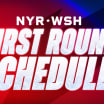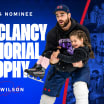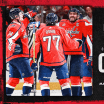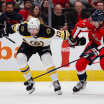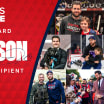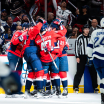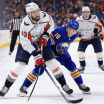For most players in the Caps' dressing room and for the men on the team's coaching, equipment and training staffs, June 7, 2018 will always stand out as one of the best days of their lives. It's the day the Caps claimed the first Stanley Cup in franchise history, beating the Vegas Golden Knights in Game of the Cup Final to set off a summer of giddy celebration and virtually instant talk of going "back-to-back."
Caps Pass Chemistry 101
With a few new faces on the ice and behind the bench, the Caps look to put some Cup rings on some new fingers
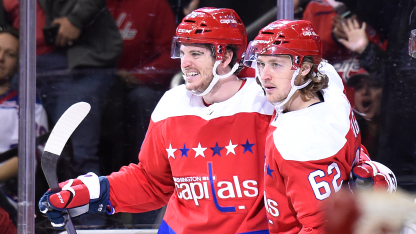
But for a handful of Washington players and coaches, last June 7 holds no real significance.
"I just had a newborn and I was traveling, so I wasn't watching much of it," says Carl Hagelin, a member of the Pittsburgh Penguins at the time. "I might have even left the country before they finished. I might have watched a little bit of one game, but not Game 5."
"I don't know if I watched the whole thing play-by-play, but I know it was on," says Nick Jensen, who was with the Detroit Red Wings last June. "I was just back in Minnesota doing my summer training. It can be a long summer when you don't make the playoffs."
"To be honest, I don't exactly remember where I was," admits Nic Dowd, then in the final month of his contract with the Vancouver Canucks. "We must have been in our Minneapolis house watching TV. Game 5 is the one where Lars [Eller] scored, right? Once Lars scored, I remember telling my wife, 'It's over.' And then I changed the channel. As a hockey player, you've seen it so much, right? Maybe you flip back and you watch them hoist the Cup and stuff, but when you're not a part of it, maybe not."
"I watched Game 5 at my in-laws' house in Windham, New Hampshire," says assistant coach Reid Cashman, then an assistant coach with the AHL Hershey Bears. "I had no idea I would be here coaching this team this season. I do have a great relationship with Todd [Reirden], and we spoke quite a bit through the playoff run, so I had some inside knowledge on what they were doing, how guys were playing and what they were thinking.
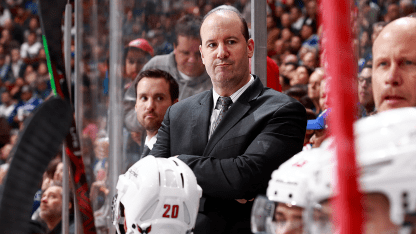
"I wasn't just watching it as a fan; I felt like I was watching it from a coach's perspective. Todd did a great job of including that as part of my development as a young coach. He knew that would help me, and I give him a lot of credit for that. But yeah, I was in Windham watching like anybody else, and cheering like anybody else, and I was awfully excited."
"All of my years, five years in New York and being a rival of the Caps and all that, I found myself being a fan," says Caps assistant coach Scott Arniel, who had recently concluded a five-year stretch as an assistant coach with the New York Rangers. "I was in Winnipeg and I was watching the Jets. I was watching them against Nashville and I was watching them against Vegas, and I even went to a couple of games.
"It was funny, but once the Final started, I became an Ovi fan and a Backy fan and a John Carlson fan. All these guys I had seen for years, I wanted to see them get a chance to win it. Maybe it was because Pittsburgh had won a couple of years in a row or whatever, but just watching that series and Ovi's leadership and the way Holts was playing, that whole team had taken it to another level and I knew they were going to be tough to beat. It was exciting. I don't usually sit and watch the whole thing, the Cup presentation and all the guys taking their turns, but this was one time I actually stuck around and watched it."
Fast forward 10 months, and each of these five men is now significantly invested in the aforementioned back-to-back scenario. Hagelin has won two Stanley Cups with Pittsburgh, and Arniel got to the Cup Final with the Rangers before losing to Los Angeles in 2014. But for Jensen, Dowd and Cashman, this spring marks their maiden voyage as participants in the Stanley Cup playoffs.
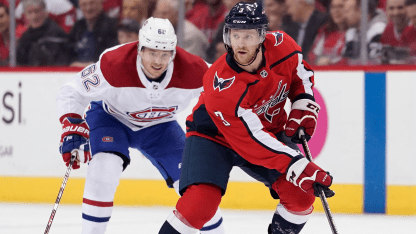
They're all in the unique position of joining the team that won it all a year earlier. There hasn't been much turnover on the Washington roster; when Dowd showed up to training camp in September, he was one of very few players in camp who weren't with the Washington organization last season. Dmitrij Jaskin joined him a month later, coming off waivers from St. Louis on Oct. 2. Hagelin and Jensen joined the Caps via trades on consecutive days in late February with Los Angeles and Detroit, respectively.
Coaching changes are unique when a team wins it all, but Barry Trotz moved on to Long Island to take the reins of the New York Islanders last summer, taking assistant coach Lane Lambert and goaltending consultant Mitch Korn with him. The Caps had been grooming Reirden for the head coach gig, so it was natural that they would elevate him to that post. Cashman was promoted from Hershey as Reirden's replacement to work with the Washington defense corps, and Arniel was hired to take over for Lambert, who was in charge of the team's penalty killing unit.
It's a good thing to join the defending Stanley Cup champions, but it's not necessarily an easy thing.
"It's certainly different than going to any other team," says Caps defenseman Matt Niskanen. "There is a different element here. The guys that were here - at least I have - tried not to over talk about it and just shove it down their throat. But I would imagine it's a weird feeling to be the new guy in a tight group like we have, and a team that had success.
"With that being said, I think this group does a pretty good job of taking in new guys and making them feel welcome right away. Still, from their perspective, I would feel like I'm almost intruding. But hopefully we've done a good enough job of integrating them and making them feel welcome and like they're an important part of the group."
Throughout the 2018-19 season, reminders of last spring's successful conquest have been almost constant. The Cup was engraved to commemorate Washington's title in September. Players got their Cup rings in October and their mini Stanley Cups in November. There were multiple rings presentations for former members of the organization on the road early in the season, and video and other reminders are omnipresent at every home game as well. When the Caps visited Toronto in February, they were feted with a lunch and a trip to the Hockey Hall of Fame, where they donated a Caps Cup ring to the museum.
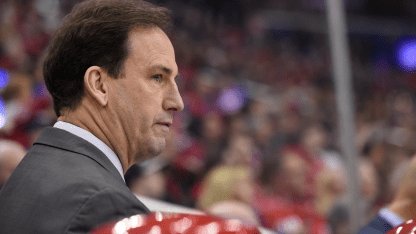
"Of all of us who came here at the start of the year, none of us have won, either," says Arniel. "Before last season, Brooks [Orpik] was the only guy who had won before. So for all of us, we have seen the video and we've seen the pictures and the things in the media over the course of the season.
"I've always dreamed of lifting that Stanley Cup. I've won a lot of things in my career, but that's the one that I haven't attained yet. So we are all excited to maybe be first-timers ourselves, and we're hoping that these guys can lead the way and show us how it's done."
Hagelin has moved from one team to another in midseason three times during his career. Does that experience feel any different when you're going to a team that is the defending Cup champs?
"Not really," says Hagelin. "The only difference is people talking about doing it again, I guess, and talking to me about how it was winning it twice. That's the only difference. Other than that, you're coming in and you're trying to help the team win as many games as possible."
With most of the Caps' core being retained from year to year over the last several seasons, the team's leadership group has become extremely adept at integrating new faces into the mix both on and off the ice, making for smoother transitions all around.
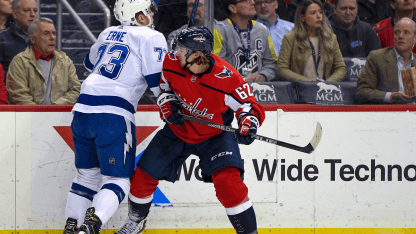
"I don't know how it would feel," says Caps winger T.J. Oshie, of joining the defending champs, "but I would imagine it can be a bit of a difficult situation. I think we do a pretty good job of bringing guys on board and making them feel welcome, a part of the team, and an important piece to the puzzle. But when you weren't here and there is so much talk about defending a championship - and you might have been on the losing side of that - I think it can be a little awkward. But our new guys that we have in here, they jump right on board. So it's good to see."
"I think they've adapted well," says Caps goaltender Braden Holtby. "They obviously bring some unique things to the table. But it's difficult. You try and put yourself in their shoes, and sometimes it's hard when you start talking about least year or stuff like that. You want to remember - players and coaches, too - but it's just a little awkward at times for them. You've got to make sure that they know they're a huge part of our team this year and our success, and our drive to do it again. As much as it is strange, I think it probably drives them more to want to do it while they are here, too."
While it can be daunting to step into the dressing room of the Cup champs so soon after they hoisted the coveted chalice, it does have its perks. If you're going to try to climb Mt. Everest for the first time, you're much better off going up with someone who has made it to the top previously, as opposed to someone who got halfway up before turning back.
"Joining a team that is the defending champs and me playing in the playoffs for the first time is pretty beneficial to me, because I don't know what to expect," says Jensen. "I never played playoff games. So I can count on these guys and watch them and do as they do a little bit. They know what the playoffs are like and they know what it takes to win the Stanley Cup, so I think it's pretty beneficial that I'm on that team that is the defending Stanley Cup champ."
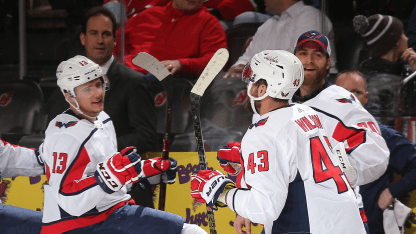
With a primary assist from Jensen, Dowd scored the game-winning goal that clinched the Caps' playoff berth on March 28 in Carolina. A week later, he scored the game-winner in the game that sealed Washington's fourth straight division title. All of Washington's newcomers have been positive additions, but as the one who has been here since the start of camp and the one who is filling the shoes of the popular and beloved Jay Beagle, Dowd has filled the bill.
"I think Dowder has really understood that everyone is an important piece," says Oshie. "How everyone plays on every shift matters, and I think the coaches have done a good job in putting a lot of trust with Dowder, and he has responded very well. I think he rises to those occasions.
"Going forward, there are a lot of things that are important, but balanced scoring and timely goals from his line is going to be really important. Sometimes those dirty goals can really propel you, and they can change a series. When those guys are on, led by him up the middle, they are playing a lot of time in the other team's defensive zone wearing out their defensemen, giving us a break and doing their job. He has done a great job, and it's nice to see his confidence pretty high going into the playoffs here."
Following a season in which he totaled just three goals and four points in 56 games with Los Angeles and Vancouver, Dowd came to the District and scored a career high eight goals in 64 games while matching his single season best point total of 22. Beagle had seven goals and 22 points in his final season with the Caps, playing 15 more games and averaging more than two minutes a night more than Dowd.
"Everyone has been incredibly welcoming - the team management and the coaching staff," says Dowd. "Reirds was very specific in what he was requesting of me when I signed here. He called me that first day, and then when I arrived here in D.C., we had a very similar conversation.
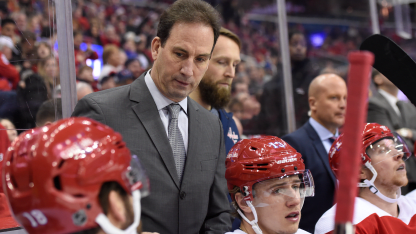
"As a player, it's great when a coach tells you what to expect so you're not thinking about what you need to do, you're not worrying about if you've done enough. If you can just check these boxes and play and anything that comes above that is a bonus in your eyes and the coaching staff's eyes, then I think it takes a lot of pressure off the player, especially coming to a new organization.
"But overall, there has just been such a sense of expectation in the room amongst the players. I wouldn't say that there has been any pressure, looking around at how guys have been reacting. There is just an overall sense of calm and a feeling of this is what we expect. We expect to win hockey games and when we do, it's not something that we make a huge deal about. And when we lose hockey games, it's the same way. I think this is the first team I've been on where there is such an overall sense of what needs to be done, and our veteran players know how to do it."
Even championship teams are going to have personnel changes on the ice, but it's a bit unusual for championship clubs to have turnover on the coaching staff. Washington added a veteran hockey lifer who has never drawn a paycheck outside of the game in Arniel - "Well, I used to cut lawns," he corrects - and a youthful up-and-comer in Cashman, who is three years younger than venerable blueliner Brooks Orpik.
"I spent a lot of time thinking about how to form our staff," says Reirden, "and I think they were exactly what I was looking for in terms of people that had specific strengths and backgrounds that I was looking for. Initially you have to learn to work together and what everyone's role is going to be, and how the work flow ends up going. You get more comfortable with people in terms of how to spend every day with them, and that's a lot of time. We put a lot of time in together with each other, and a lot of times it's in very close quarters. So it's important that you find people that have similar interests and are driven by the same types of things. I thought that both of these guys in particular were going to satisfy that for our staff."
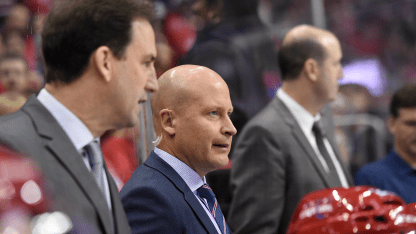
From the start of camp last September up to the start of the playoffs this week, the newly cobbled coaching staff - along with holdover assistant coach Blaine Forsythe, goaltending coach Scott Murray, assistant/video coach Brett Leonhardt and video coach Tim Ohashi - has worked together at developing their own unique brand of chemistry both on and especially off the ice.
"I think one of the areas where our staff has grown," says Reirden, "and it has followed right along with our record - is when you bring two new people in, as much as you spend all of the time teaching them and showing them how we want to do things, I also want to evolve and get better and learn from them. So you're open to people's thoughts and different ways of doing things.
"That being said, we had a pretty good blueprint for how we do things, with how our team ended up working out last year. Probably for the better part of the first 20 and closing in on 30 games, it was a very open discussion. I was talking and learning and giving them a place to talk about the game, to give me their perspectives on things, to talk about different experiences they've had, and I wanted to give everyone a voice in the process. I think that's very important as leader, to be able to set up situations where people can talk and do their jobs.
"We went through just as much in terms of learning how to live with each other, not just hockey-wise, but having breakfast, lunch and dinner together many times, and growing that way. We also grew in terms of sharing knowledge of the game and the plan moving forward.
"I don't think that really got to a spot that was where we all wanted it until probably after Christmas time. And then we went through a little bit of a tough time with the losing streak, and had a good plan coming back after the [All-Star] break to start moving forward. At that point, our roles and responsibilities had been much more clearly defined, and we started to have a better understanding of what was expected from each other - what I expected from them and what they expected from me - and then not only did our team start to play better, but I felt like we started to coach better together. Just like you grow your team, in this situations we probably had to grow our staff more than we had to grow our team, because of the way things had gone in the past."
Rinkside Update | Nic Dowd
For the last four seasons, the Caps had easily the best and most experienced coaching staff they've had in their franchise's history. It wasn't always smooth sailing in their relationships with one another, but they were able to rise above any lingering and festering issues to help guide their team to a Cup championship last spring. In the wake of that, they've had to adjust to new faces within their ranks for the first time since 2014.
"We definitely had our differences in the past," admits Forsythe, "but we were still pretty close and we were all in it for the common reasons and there was always a respect and still a brotherly love with all of us. Our group now is a different set of guys, but a real close group with Stretch [Leonhardt] and Timmy and Scotty. We spend a ton of time together, and we enjoy that. We want to spend time together, whether it's at home or on the road or in the office here. That part of our room is great.
"It's just about how we can translate that chemistry from our room and into the players' room. They know it, and they know situations of how coaches are and how they react and work with each other, and they feel like we've got a good bond going there and I think it has kind of fed into that room as well, which as a coach, that's what you always want. You always want to show unity with everybody and make sure they know we are all on the same page, and it's a lot easier for them to do their jobs when we are all in agreement."
So far, so good.
"For me, the transition has been amazing," says Arniel. "Usually as a new coach, you're coming into a situation where the team is being blown up or management and the coaching staff and everything is changing. Everything is in a little bit of disarray and you're trying to find the answers. This is 100 percent night and day different. You're coming to a team that is already a well-oiled machine, and you're just trying to stay out of the way and trying not to screw it up.
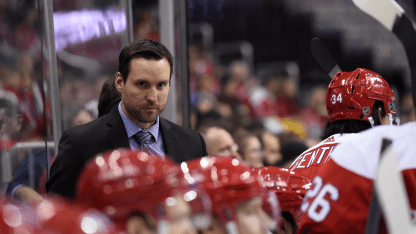
"The players have been unbelievable in welcoming me in and letting me be a part of this. I think I have already gained some great friendships. We had some good teams in my years in New York and we always said we had a chance to win if we got in.
"This team is a little bit different. This team has a real good chance to repeat and to win again because they have the history, they have the experience from last year, and they know what it tastes like. It's not something I have tasted before, and I can see it over the course of these 82 games. There were games where we played bad, and all of a sudden our leadership group decided that it's time to step up - you just saw one recently in Tampa - and they decide to take it to another level. That's something that's very exciting for a coach, and for being a first-timer here."
While Cashman was in the Caps' organization as a Hershey assistant for two seasons before ascending to his current post, this season was his first extended taste of the NHL. As a player, he rose only as high as the AHL, where he briefly played for Reirden as a member of the 2008-09 Wilkes-Barre/Scranton Penguins. Three seasons later, he took the coaching plunge himself, signing on as an assistant at his alma mater, Quinnipiac University.
"They just won the Stanley Cup," says Cashman. "The [defense] corps in particular was all coming back, and the guy who has molded that [defense] corps - which was Todd - is still on staff and is now the head coach. So it's unique from a perspective of they didn't need a lot from me out of the gates. My mindset was to just be a resource for this group, get to know this group, and build relationships with this group.
"One of the first things I did when I got here and before training camp started was I went to lunch with Brooks and with John [Carlson] and with Nisky. And I said, 'I'm here as a resource for you guys, I'm here to help you guys maximize your abilities, and whatever you need, let me know. And when I see things, I'll let you know.' But I was pretty aware of how much I gave these guys and showed these guys and it wasn't a ton early. It was more about building a relationship with them. And to their credit, any ideas or coaching I did, they were very open-minded to it. But they don't need a lot."
During his seasons behind the Washington bench, Trotz often reminded media that in addition to developing hockey players, the Washington Capitals were also in the business of developing coaches. Both Reirden and Cashman are evidence of that organizational philosophy.
"We have a good group," says Cashman. "We get along really well. I think Foz and Arnie have really looked after me. As guys who have been in this league for a long time, they have pulled me aside when they see something good, or a teaching moment. 'Hey, here is a good time to grab a guy like this,' or 'Hey, this is a good time to back off a guy like this.' They've just been through so many experiences, those two guys.
"I have learned a ton from Arnie; we sit next to each other on the plane. It's his PK, but I try and help him with the PK a little bit. His career is something that I would like to have someday. My development path has accelerated for sure being around those two guys, Foz and Arnie."
Whatever hurdles may have existed in the dressing and coaches' rooms seem to have been cleared, and the Caps exhibited a strong finishing kick to the regular season, going 21-9-2 after the All-Star break. On most of those nights, they looked like a well-oiled machine both on the ice and behind the bench.
"I don't really know how to describe it," says Caps right wing Tom Wilson, "but anyone who has come to this team since I have been here, you just come in and it's a special place. It's a good group of guys. The core guys care about each other and I found that six years ago, and it really hasn't changed since.
"For some reason the ability for the team to mesh and guys to get close is easy, and that's a testament to the character of the leaders and the guys who have been here for a long time. I think with the coaches, it's no different. They each bring things to the table. Cash and Arnie are two really good guys and they each bring specific stuff to the table that Todd liked and wanted to bring them on board. I think it's exciting to have a new group and to go through it together. You want to get back there again and you want them to be a part of it. It's fun to have new faces and it was definitely refreshing at the beginning of this year to have a new head coach and new assistant coaches. It was a good transition."
"I haven't seen them in their meetings and behind closed doors when they debate stuff," says Oshie, "but it seems like they really enjoy working with each other. I think they all really respect each other's voice. And we get coached in a balanced way as far as practices and who is running what drills, and hearing different voices in the meetings. And I think Todd has done an excellent job of being that head coach voice, the main voice that directs where we go on a day-to-day basis."
That chemistry that is so important on the ice with linemates and defensive partners is also critical behind the bench and in the coaches' room where crucial decisions are being made as the season plays itself out. And just like with players, management never really knows how it's going to go until it goes.
Brian MacLellan | April 8
"It's no different than bringing in new players," says Caps general manager Brian MacLellan. "You've got to find how that group functions in their responsibilities. So Todd coming in has to learn, how am I going to be a head coach? How am I going to delegate? What decisions do I want to make? How are we all going to interact? I think in the beginning, they are all feeling each other out, and you've got Reid learning how to deal with NHL players versus AHL players and college players. You've got Scott Arniel trying to figure out his role as a more experienced NHL coach and an NHL player coming in with a relatively young and inexperienced group. He is trying to figure out, how do I contribute to this and what's my role in this? And Todd was trying to figure out, how much am I delegating? How much am I doing? Do I want to be involved in everything? Who do I trust with this and with that?
"So it's like putting a team together, and you've got to let them figure it out, and gel and grow. How do they interact? How do they handle issues? How do they get better? And I think they all have gotten better. For Todd, he has always done the defensemen. Can he just turn it over to Reid? How involved is he with Reid? Those are things that go on all year that result in growth in both coaches and your whole coaching staff, and how it's perceived by the players. In hindsight, it looks like it worked out and everybody is comfortable and everybody has gelled together."
After a full training camp and 82 regular season games, this group is now ready to see what it can accomplish together in the 2019 Stanley Cup playoffs. Dowd, Jensen and Hagelin all have the makings of potential unsung heroes, and the team's newest coaches will vie to have the impact of last season's coaching staff. That group was able to figure out how to best go about winning each of those four playoff series, and it was able to get that message through to the players and to get them to buy in.
Washington was 9-7 in the first four games of its four playoff series last spring, and it was 7-1 thereafter. Once the Caps' braintrust figured out how to snuff out an opponent, the players were able to take that information and make it happen on the ice.
"As a coach, me personally, I never want to be on the forefront," says Forsythe. "But you always want to feel personally and within your group that you're helping them make a difference. In that situation [last spring], there was definitely some help and some push from our coaching staff. But there was also a strong hunger and belief in our room in whatever we were doing at any point in any series. And for me looking back at it now, that was from all of those negative experiences they gained from as a group.
"We had been in that situation however many times in the last "x" amount of years that we have all been here. I think other than maybe the Philly series a few years ago, we never really had a strong lock on a series up until the Final, the Vegas series. So we had been in those 2-1 series, those 2-2 series, been down 3-2 in a series where we had to win Game 6, like in the Tampa series. So the more you gain as a player experience-wise, we are also gaining too. 'Why didn't this work?' Or, 'Remember when we tried that a couple of years ago and that really helped push guys?' So you're trying to draw from those past experiences, many of them that were negative, and use them in a positive way."
Reirden absolutely relishes the opportunity to see the same opponent in a series, and he welcomes the challenge of trying to break down the opposition and take them apart in a best-of-seven situation.
Todd Reirden | April 10
"Everyone has a role and a responsibility," says Reirden, "whether it's coaches or players, and the importance of it is heightened come playoff time. I think everyone - from a coach's standpoint, in terms of their areas of responsibility - is able to get a little more focused than they have in the past 82 games, because now you have the same opponent day in and day out.
"If you do have the ability to see trends that are going on in games or watch the same player play over and over and over again, then you start to get some better reads on tendencies and stuff that you can watch on film - stuff that always grows a little bit when you watch it live and in person from behind the bench. Now you're able to really get into certain things that you see that happen, things that you can't see on video."
Video is one of the best modern tools for NHL coaches, but for Reirden, there is no substitute for seeing the same opponent, shift after shift, game after game, and decoding what he sees with his eyes from behind the bench.
"I think in the past we've always done a really good job of preparing our team," he says. "I don't feel like they've ever been unprepared in any area. But I just feel like you pick up different nuances of certain players and certain strengths and weaknesses of guys when you see them live. And if you are able to watch their eye contact - where they are looking when they are making plays - that is stuff you can't see when you're watching an overhead video. And that is stuff that in particular has been a strength of mine, is watching players in those situations and understanding where they are looking to go with the puck, even if it doesn't get there.
"That's something you can only tell by being at ice level, and now I start to get a better feel for that player, and maybe even some things that they're being told systematically. I enjoy that part of seeing the same opponent game after game, and it has been a strength of our staff in the past, and I expect it to be moving forward here - the ability to make adjustments and be able to make reads on what the opposition is trying to do and how to break down certain tendencies that they are showing throughout a series."
The time to compete for the Cup is here once again, and the guys who have won it are all about trying to win it again, while the guys who haven't tasted the sweet nectar of victory from the sliver chalice are as thirsty as ever to do so.
"You want to create your own memories with this team," says Holtby. "Obviously last year's team is going down in history, but now this year is new and you want to make sure you're including those guys. I think they have personalities where they blend with our team really well, so it hasn't been an issue at all. They have improved our team. It's one of those things where we want to do it again, but it will be a bit of a different group, so it will be a new experience in the playoffs in trying to do it again."
"I don't think the hunger for the Stanley Cup is any different between us and the other guys, even though they won it last year," says Jensen. "I think the same amount of hunger is there, it's just for different reasons; mine obviously being that I've never won it, and theirs being that they want to get back to that point because that feeling of what it feels like to win that Cup."
If the Caps are able to pull it off again, none of this bunch will be watching on television.
"If you were to ask me then if I thought I'd be on this team now," says Jensen, referring back to last spring, "there's no way I would have thought so. It's crazy thinking about the path I took, going from watching this team last year to being on it and getting ready to start the playoff run. It's pretty crazy, but it's exciting and I wouldn't have it any other way."
Any residual awkwardness in the room from some guys having sipped from Lord Stanley's grail while others have not would instantly be gone if this June goes as last June went for Washington.
"I think so," agrees Oshie, who birthed the back-to-back chatter at the Cup parade last June 12. "Just do 'er again and the awkwardness will be gone and they can celebrate with us."

